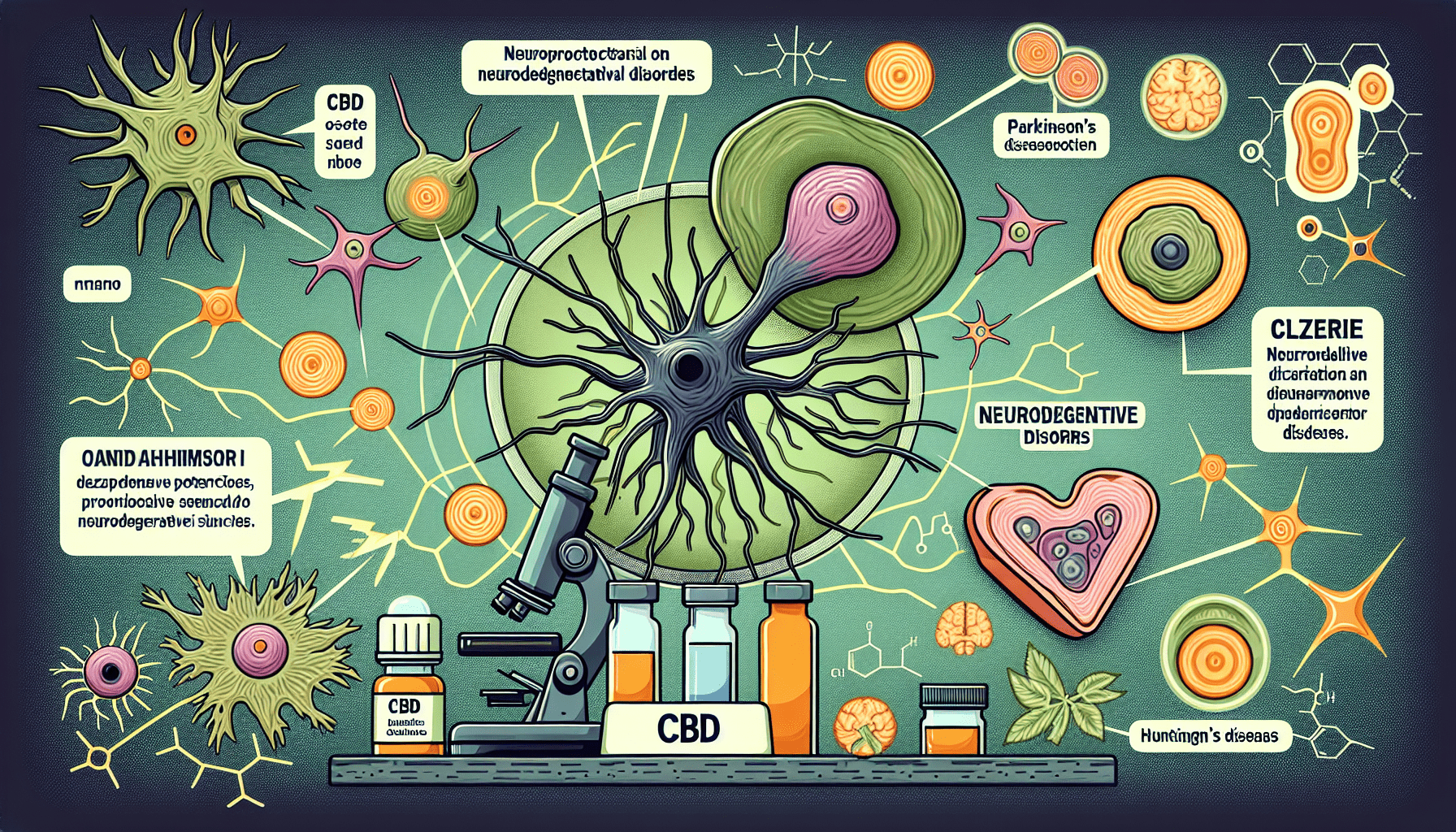Have you ever wondered about the neurodegenerative effects of CBD? CBD, short for cannabidiol, has gained increasing attention in recent years for its potential therapeutic benefits. While CBD is known for its positive effects on various ailments, such as pain relief and anxiety reduction, its impact on neurodegenerative diseases remains a topic of interest. In this article, we will explore the potential neurodegenerative effects of CBD, shedding light on how it may offer hope for those affected by conditions like Alzheimer’s and Parkinson’s diseases. Join us as we delve into the exciting world of CBD and its potential to combat neurodegeneration.

Introduction
Welcome to this comprehensive article on the potential effects of CBD on neurodegenerative diseases. In recent years, CBD has gained significant attention for its vast range of therapeutic properties, and researchers are studying its potential benefits in various health conditions. Neurodegenerative diseases, such as Alzheimer’s disease, Parkinson’s disease, and multiple sclerosis, affect millions of people worldwide, causing progressive deterioration of neurologic function. In this article, we will explore the potential neuroprotective properties of CBD and its possible benefits in treating these debilitating conditions.
Understanding Neurodegenerative Diseases
Neurodegenerative diseases are characterized by the progressive degeneration of neurons in the central nervous system. These diseases result in a decline in cognitive function, motor control, and other essential neurological processes. Examples of neurodegenerative diseases include Alzheimer’s disease, which affects memory and cognitive abilities, Parkinson’s disease, which impairs movement and coordination, and multiple sclerosis, which damages the protective covering of nerve fibers.
CBD and its Potential Effects
Overview of CBD
CBD, short for cannabidiol, is one of the many cannabinoids found in the cannabis plant. Unlike THC, another well-known cannabinoid, CBD does not produce the psychoactive effects commonly associated with marijuana. Instead, CBD is believed to interact with various receptors in the body, including those in the endocannabinoid system, to produce its potential therapeutic effects.
CBD’s Interactions with the Endocannabinoid System
The endocannabinoid system (ECS) is a complex network of receptors and molecules that play a crucial role in maintaining homeostasis in the body. CBD is thought to interact with the ECS by modulating the activity of CB1 and CB2 receptors. By doing so, CBD may provide a wide range of effects, including neuroprotective properties.
Neuroprotective Properties of CBD
CBD’s Anti-inflammatory Effects
Chronic inflammation in the brain is associated with the progression of neurodegenerative diseases. CBD has been found to have potent anti-inflammatory effects, potentially helping to reduce inflammation and its damaging effects on neurons. By suppressing neuroinflammation, CBD may contribute to the protection of neuronal cells and the preservation of cognitive function.
CBD’s Antioxidant Effects
Oxidative stress, caused by an imbalance between free radicals and antioxidants in the body, is another contributing factor to neurodegenerative diseases. CBD has been shown to possess antioxidant properties, allowing it to neutralize harmful free radicals and reduce oxidative damage to neurons. By acting as an antioxidant, CBD may help protect against the degeneration of brain cells and slow down the progression of neurodegenerative diseases.
CBD’s Anti-excitotoxic Effects
Excitotoxicity refers to the excessive stimulation of neurons, leading to cell death. This process plays a significant role in the development of neurodegenerative diseases. CBD has been found to exhibit anti-excitotoxic effects by regulating the release of excitatory neurotransmitters and preventing neuronal damage caused by excessive stimulation. By modulating excitotoxicity, CBD may help protect neurons from degeneration and preserve their function.

CBD and Neurodegenerative Diseases
Potential Benefit of CBD in Alzheimer’s Disease
Alzheimer’s disease is characterized by the accumulation of beta-amyloid plaques and tau protein tangles in the brain, leading to cognitive decline and memory loss. CBD has shown promising results in preclinical studies as a potential therapeutic agent for Alzheimer’s disease. It has been found to inhibit the formation and accumulation of beta-amyloid plaques and reduce neuroinflammation, potentially slowing down the progression of the disease and improving cognitive function.
Potential Benefit of CBD in Parkinson’s Disease
Parkinson’s disease is characterized by the degeneration of dopamine-producing neurons in the brain. This leads to motor symptoms such as tremors, stiffness, and difficulties with movement. CBD has shown potential in managing Parkinson’s disease by interacting with the ECS and other receptor systems involved in the regulation of motor control. Studies have suggested that CBD may help reduce motor symptoms, improve quality of life, and potentially slow down the progression of the disease.
Potential Benefit of CBD in Multiple Sclerosis
Multiple sclerosis (MS) is an autoimmune disease that affects the central nervous system, resulting in damage to the protective covering of nerve fibers. CBD may offer potential benefits in managing MS by its anti-inflammatory and immunomodulatory effects. Research suggests that CBD may help reduce neuroinflammation, protect against neuronal damage, and alleviate symptoms such as pain, muscle spasms, and fatigue in patients with MS.
CBD’s Role in Neurogenesis
Promotion of Neurogenesis
Neurogenesis is the process of generating new neurons in the brain. It plays a crucial role in maintaining brain health and plasticity. Emerging evidence suggests that CBD may promote neurogenesis, potentially aiding in the regeneration and repair of damaged neurons in neurodegenerative diseases. By stimulating the growth of new neurons, CBD may contribute to the restoration of cognitive function and motor control in individuals with these conditions.
Enhancement of Brain Repair and Regeneration
In addition to promoting neurogenesis, CBD has shown potential in enhancing brain repair and regeneration. It has been found to support the generation of myelin, the protective covering of nerve fibers that is often damaged in neurodegenerative diseases. By facilitating the repair of damaged neurons and promoting the growth of myelin, CBD may help restore proper neuronal communication and function in individuals with these conditions.

Clinical Studies on CBD for Neurodegenerative Diseases
Numerous preclinical and clinical studies have been conducted to investigate the potential effects of CBD in neurodegenerative diseases. While some studies have shown promising results, more extensive research is needed to establish the optimal doses, treatment durations, and long-term effects of CBD in these conditions. Clinical trials are ongoing to evaluate the efficacy and safety of CBD for neurodegenerative diseases, and the results will provide valuable insights into its therapeutic potential.
Possible Side Effects and Considerations
Interaction with Other Medications
CBD has the potential to interact with other medications due to its effects on various enzymes involved in drug metabolism. It is essential to consult with a healthcare professional before starting CBD treatment, especially if you are taking other medications. Your healthcare provider can help determine the appropriate dosage and monitor any potential interactions between CBD and your existing medications.
Quality Control and Product Safety
As with any dietary supplement, it is crucial to choose high-quality CBD products from reputable manufacturers. Third-party lab testing can provide assurance of product quality and safety. Additionally, it is important to follow the recommended dosage guidelines and start with a low dose when beginning CBD treatment. Monitoring your response and consulting with a healthcare professional can help ensure the safe and effective use of CBD for neurodegenerative diseases.

Future Directions and Research
Areas of Future Research
The emerging field of CBD research offers numerous avenues for future exploration. Further studies are needed to understand the precise mechanisms by which CBD exerts its neuroprotective effects and its potential interactions with other therapeutic agents. Additionally, investigating different formulations, delivery methods, and combinations of CBD with other compounds may enhance its effectiveness in managing neurodegenerative diseases.
Clinical Trials and Long-term Effects
Ongoing clinical trials will provide valuable insights into the efficacy and safety of CBD for neurodegenerative diseases. By conducting large-scale, well-designed studies, researchers can assess the long-term effects of CBD treatment and evaluate its potential as a standard therapy for these debilitating conditions. Continued research is essential for establishing evidence-based guidelines and optimizing the use of CBD in neurodegenerative diseases.
Conclusion
In conclusion, CBD has shown significant potential in providing neuroprotective effects and potentially benefiting individuals with neurodegenerative diseases such as Alzheimer’s disease, Parkinson’s disease, and multiple sclerosis. Through its anti-inflammatory, antioxidant, and anti-excitotoxic effects, CBD may help protect neurons and slow down the progression of these debilitating conditions. However, more research is needed to fully understand the optimal use of CBD, determine appropriate dosages, and evaluate its long-term effects. If you or a loved one is considering CBD treatment for a neurodegenerative disease, it is essential to consult with a healthcare professional for personalized guidance and monitoring.

